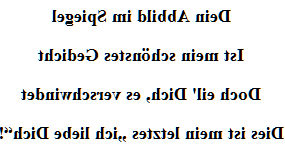German love poem
Der Spiegel
Dein Abbild im Spiegel
Ist mein schönstes Gedicht
Doch eil' Dich, es verschwindet
Dies ist mein letztes „ich liebe dich“
Was die Sprache Ihrer Geliebten sei, ist "la Glace" ihr Spiegel!


→ French poem ←
Atalanta & German, her language
A divine and devilish memory at once in this German love poem (Liebesgedicht). Memory of an Amazon, Atalanta, or of "her cousin" Penthesilea, and of their metamorphosises to seduce. Your picture in the mirror will always remain to me a pretty good love poetry. You were my little German. I met you in faculty, where you shone, we sat on the same bench, then we have forgot all about reality! You preferred "ich bin in dich verliebt" to "ich liebe dich", but there is no matter because all that is over and done.
Tomorrow, however, another German woman will ring to my door, and we will talk about Rilke, "letters to a young poet" and about a lot of other very personal things!
My poem translated into German, resonates in me in a very particular way.
I let others carry and take it away to make it fly, i would it take the most beautiful flight!
101 million German-speaking speakers counting the diaspora, speak this West Germanic language born in the Middle Ages. This is of course the official language of Germany, but people also speak German in other countries.
The Upper and Lower German dialects that come from Frisian, separate in the 7th century. In the North Teuthonia, Low German will give birth to Dutch. For the German, the koine who will prevail, will be that of Saxony, a German-Saxon-Thuringian dialect, used by Luther who will enrich it.
Many Germans are still native speakers of a German dialect.
The old High German (8th-11th) is marked by the reign of dialects (alemanic, Bavarian, Frankish) and Latin. The medium high German lasts until the 15th century and Latin is definitively ousted by the vulgar language, but subsits until the 14th for administration, justice, diplomacy. French with its "trouvères and troubadours" will be very influential. The minnesingers (poets of courtly love) and the epics, bring out a literary koine, but it is the language of an elite, the population speaks only dialects.
Luther with his translation of the Bible opens the way to modern German, a language of culture that will be taught from the 17th century. In the 18th century it is the influence of France, Leibniz and Frédéric 2 write in French, but it is also the generation of Goethe and Schiller that initiate the revival of the language, revival pursued by Grimm, Heine.
Ô triste, triste était mon âme - À cause, à cause d'une femme. - Verlaine (Fêtes galantes - 1869).
German literature
The literature in German language flourished from the beginning of the 13th century. With two great works whose authors are unknown: "the song of the Nibelungen" and "Gudrun". In the 13th century, the chivalric literature disappear in front of bourgeois literature. Luther in translating the Bible, creates the modern German.
The 17th century, is divided between theosophical writings, lyrical symbolism, mysticism and picaresque irony. Around 1680, German literature began to clearly outweigh Latin-language literature. Christop Martin Wieland influenced by the ancients, the French and by Shakespeare, appears as the precursor of classicism.
Around 1770 it's a literary revolution initiated by Johann Georg Haman, Johann Gottfried Herder etc. Grouped around the young Goethe. Antiquity gradually supplant Shakespeare and turn towards classicism, Goethe and many others, including Schille, who will know the same evolution under the influence of Kant.1790 develop the Romanticism, Novalis is a poet of science, a philosopher and a mystic, and Friedrich Schleiermacher, who find religion and poetry on an aspiration to the universal.
In the 19th century, Romanticism split into two: this of Berlin with E.T.A Hoffman and this of Heidelberg with the brothers Grimm. The romanticism with Heinrich von Kleist, has a dramatic expression. The movement of young Germany moved away from romantic dreams by introducing politics, it will be extended by an esthetic of compromise and a poetic realism (Immermann, Annette von Drotse-Hulshoff etc.). A new era begin around 1890 with Detlev von Liliencron, Richard Dehmel, Christian Morgenstern. Three poets emerge, and their poems are at the origin of the contemporary German poetry: Stefan George, Hugo von Hofmannsthal and Rainer Maria Rilke. Psychological impressionism also marks the beginnings of novelists (Hermann Hesse).
Around 1910 come Expressionism, a cry of anguish and revolt of poets, in front of the violence and the break-up of European civilization (Else Lasker-Schuler, Ernst Stadler, Georg Heym, Gottfried Benn). After the First World War a new realism appeared (Erich Maria Remark, Brecht). The Nazism that castigated degenerate art force many writers to the silence or exile. In 1945 the only literature received is this, of the Resistants to the Hitler regime, and exiles like Thomas Mann. After the war the masters are Hermann Broch and Robert Musil. German poets like Schnurre seek to restore poetry to its purity.
The painting of Germany today is more realistic in the novels of Gunter Grass, more controversial in the poems of Uwe johnson. Subsequently, writers insist on the fictional character of their works and testify to a great mistrust of language, to which they reproach its ambiguity. This mistrust is even greater among poets (Heissenbuttel, Gunther Eich), in whom there is a common tendency: language becomes the very object of poetry. Then comes a counter-literature which denounces the artifice of every work. Closer us, Patrick Süskind with "perfume" will make shine the German literature with his worldwide success.
This little translation of my love poem into German, resonates inside me, in a very particular way, i hope that it couldt take the most beautiful flight! Take it and bring it to do it fly away.